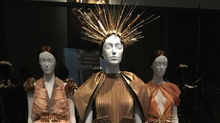Terraforming Ourselves
I review Science Fiction: A Literary History:
"[W]hat becomes clear from a survey of science fiction’s history is that, if there’s one thing these authors love more than cosmic wonder and terror, it’s petty fights about what constitutes “real” science fiction.
Not, of course, that these science fiction fights aren’t proxies for fights about science or society itself. Science Fiction: A Literary History, recently published by the British Library and edited by Roger Luckhurst, chooses to forego defining the genre in order to discuss the sociopolitical stakes behind some of those “Whose Science? Which Fiction?” debates. Each of its contributors seems to have his or her own position on that definitional question, anyway. The eight chapters by different sci-fi scholars cover topics from “The Beginning, Early Forms of Science Fiction” to “New Paradigms, After 2001.”
I have my own heretical position on this, as I don’t believe science fiction is a genre at all. Reading Science Fiction: A Literary History didn’t convert me, as the authors languidly gesture toward a generic definition with phrases like: “The SF genre cannot be defined as a single, fixed conceptual object; it is a continually shifting matrix of megatexts . . . .” It all depends on what one means by genre, of course, but if categories like “comedy” and “tragedy” are genres, then it has something to do with how the story unfolds. Will it end in marriage? In death? Knowing that a given story is sci-fi doesn’t tell you much about its plot, only what sort of things might appear in it: alien beings, travels in time, world-shaking technology, and so forth. There are sci-fi subgenres, like the robot mysteries perfected by Isaac Asimov, but those are, generically, detective stories, for which Asimov’s puzzle-box robot ethics merely provide a complication. Science fiction is a category of universe in which stories can happen, not a category of story.
The best definitions of science fiction are evocative rather than exhaustive. Ray Bradbury, in the introduction to the 1974 collection Science Fact/Fiction, wrote, “Science fiction then is the fiction of revolutions. Revolutions in time, space, medicine, travel, and thought. . . . Above all, science fiction is the fiction of warm-blooded human men and women sometimes elevated and sometimes crushed by their machines.” Bradbury is onto something here: Revolutionary change, often but not exclusively technological, is one of the most vital subjects for science fiction. Confronting that change might be the core of the story, as in first-contact narratives from Wells’s War of the Worlds to Ted Chiang’s “Story of Your Life” (the basis of the film Arrival). Or the revolution might have occurred in the narrative’s past, with the story examining how and if people can live in their brave new world. This is often the set-up for novels of utopia and dystopia.
One of the most interesting things Science Fiction: A Literary History reveals is how difficult it is to write utopias. Surely the point of the exercise is to paint a picture of a world readers might want to live in. And yet for every author’s utopia, there’s a coterminous dystopia for the reader with eyes to see."






















